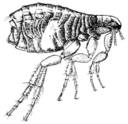Because of the all the rain over the last 6 months and now the very warm days, fleas are hatching in unprecedented numbers around Canberra.
Signs of flea infestation:
- Cats develop an allergy to flea bites. They groom or scratch excessively and develop “miliary” dermatitis.
- The fleas cause anaemia in kittens and debilitated animals.
- Cats are infested with tapeworm (Dipylidium caninum) from eating infected fleas during grooming.
Flea control
- Conquer fleas on your cat with long lasting flea control products (Frontline, Advocate, Revolution, Advantage) applied as a spot on. Flea collars, shampoos and powders kill fleas present on your cat at the time of application but have little residual effect.
- Remove flea eggs, larvae and pupae from the environment with regular vacuuming of carpets, sofas and beds. Throw away or burn the dust bag to prevent eggs and larvae developing.
- Professional fumigation controls larvae and pupae.
- Wash bedding in hot water or replace regularly.
- Spray garden sheds, cars and favoured outdoor sleeping spots.
Cat fleas hatch from flea pupae in your house in warm, humid conditions. Our carpeted, centrally heated homes are ideal for the year round development of fleas.
After feeding on a cat adult female fleas lay eggs that fall off onto couches, carpets and beds. The microscopic eggs develop first into larvae that migrate deep into carpets, furniture or cracks in floors away from the light, and then into pupae. The pupae contain adult fleas which lie in wait for the next cat or dog to pass.
Effective flea control depends on knowing the flea’s life cycle.



